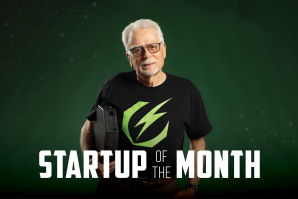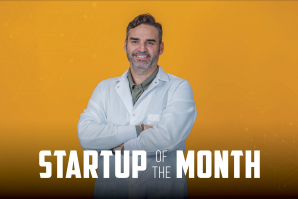Consider humans. They get sick and spread disease between each other, and usually take action only after symptoms show up. Last November, five undergrad friends at Caltech wondered: What other industries have a reactionary health care problem?
Six months later, their startup, Nexa Labs, took home first prize at the 2025 UC Davis Big Bang! Competition for a solution designed to give farmers real-time health data on livestock so they can catch diseases early.
Cattle wasn’t the obvious answer at first, says Zarif Azher, co-founder and CEO of Nexa Labs. No one on the team has farming experience. But Azher’s family is from Bangladesh, where most of the population raises livestock. This was a seed that inspired them to reach out to more than 100 U.S. farmers and ask about livestock health. And what they learned was shocking.
“When we talk to farmers here in the U.S., we realize that the vast majority, like 70 to 90 percent, keep up with their animals’ health just by looking at them,” Azher says. “As you can imagine, this doesn’t actually catch disease before it’s too late.”
As a result, farmers aren’t losing money just from animal deaths. Bovine illnesses also drive up prices for beef and milk, contributing to nearly $400 billion each year in global livestock disease losses.
Nexa Labs came up with a biosensor, like a microchip, to put through the ear, inside the animal to automatically collect data: heart rate, respiration rate, blood oxygen and body temperature. This tracking information will keep farmers up to speed on the status of their herds. The technology targets bovine respiratory disease, the most common and costly health issue for cattle. The technology will evolve to detect a wider range of health issues in the future, he says, and may also be something humans can use.
The team — which also includes CTO Alvin Zhang, CFO Kenneth Chan, COO Kyle Berkson and CPO Samuel Xie — won $25,000 from the UC Davis startup competition, which celebrated its 25th anniversary this year. The money will support validation trials in the upcoming months to test the technology with partner universities.
One of these trials will be overseen by Ondieki Gekara, assistant professor and lead coordinator of the Animal Research Institute at Cal Poly Pomona. Gekara has previously worked with GPS-based systems, such as collars and ear tags, but an internal monitoring device is new territory.
“It’s a good thought,” he says, “but it needs to be tested. We understand this could be a major breakthrough. We’ll wait and see.”
Once the protocol is approved, he says, about four to eight animals will be designated for trials. The tests will then determine if the technology works as expected, collecting data to detect disease early. The team will also be able to evaluate the size of the implant. Does the biosensor need to be smaller? How small can it be and still function optimally?
In addition to technical aspects, Nexa Labs must also navigate responses from animal welfare groups, who may have concerns about animal safety and comfort. Gekara believes educating these groups would be key. Azher notes education also plays a vital role in the team connecting with farmers.
“One of our realizations has been that farming and livestock are conservative industries,” he says. “People are hesitant to adopt new technology — and with good reason. A lot of the technology that people have tried to introduce to the livestock industry has not really worked that well.”
In order to overcome the skepticism, he emphasizes how important it is to “form a personal connection.” Besides reaching out directly to farmers, the team also prioritizes input from industry experts.
“The other thing that we’re really making an effort to do is make sure we have advisors who are really well-versed in agriculture and in livestock,” he says. “To make sure that a) we have the necessary knowledge as a team, and b) we’re able to have more credibility with farmers to ultimately make the connections easier.”
–
Stay up to date on innovation in the Capital Region: Subscribe to the Comstock’s newsletter today!
Recommended For You

Startup of the Month: InnerPlant
Detecting crop diseases before symptoms show
InnerPlant develops seed technology that turns crops into living sensors that detect stress (such as fungus, pathogens and nitrogen deficiency) at the molecular level before visible symptoms appear. The startup’s initial focus is a soybean engineered to emit a fluorescent optical signal within 48 hours of fungal infection.

Startup of the Month: CREE8
A ‘studio in the cloud’ connects creatives worldwide
“I wanted to build a platform that removed those barriers,” says Lisa M. Watts, CEO and founder of CREE8, “enabling creators to work from anywhere with the same power as an enterprise-grade studio. Truly reinventing the future of work.”

Startup of the Month: Off The Wall Energy
Energy device puts power usage in consumers’ hands
With a family of six, Bob Guimarin had three “power problems”: 1) too many cords, 2) too many outages and 3) not enough ports in the van during road trips. Being a serial entrepreneur, Guimarin came up with a way to simplify power management and reduce reliance on external sources.

Startup of the Month: MyFloraDNA
Gene-editing startup aims to create allergy-free peanut
Peanut allergies affect around 6.1 million Americans, with cases rising as awareness has grown. A 2017 study found that peanut allergy had increased 21 percent since 2010. But what if there was a way to eliminate the genes responsible for peanut allergies?



